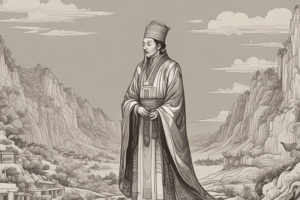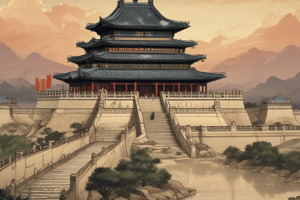Podcast
Questions and Answers
What was one of the main objectives of the Great Wall during the Qin Dynasty?
What was one of the main objectives of the Great Wall during the Qin Dynasty?
- Serve as a religious pilgrimage site
- Encourage foreign invasions
- Control trade routes between nomadic tribes in Mongolia and China (correct)
- Promote international tourism
How did the Great Wall help regulate the silk road economically?
How did the Great Wall help regulate the silk road economically?
- By increasing taxes for the merchants
- By facilitating the movement of goods and ideas (correct)
- By preventing any trade from happening
- By promoting isolationism
What role did the Great Wall play in defending against invasions?
What role did the Great Wall play in defending against invasions?
- Prevent internal rebellions
- Protect against invasions by the Xiongnu (correct)
- Defend against attacks from mythical creatures
- Serve as a diplomatic meeting place
How did the Great Wall influence Chinese culture?
How did the Great Wall influence Chinese culture?
How did the Great Wall contribute to the rise of China as a major global power?
How did the Great Wall contribute to the rise of China as a major global power?
What was the primary purpose of expanding the Great Wall under the Qin Dynasty?
What was the primary purpose of expanding the Great Wall under the Qin Dynasty?
What was the ultimate purpose of the Great Wall according to the text?
What was the ultimate purpose of the Great Wall according to the text?
In what way did the Great Wall impact Chinese culture?
In what way did the Great Wall impact Chinese culture?
Which group of people were NOT involved in the construction of the Great Wall?
Which group of people were NOT involved in the construction of the Great Wall?
What does the Great Wall symbolize about ancient Chinese leaders according to the text?
What does the Great Wall symbolize about ancient Chinese leaders according to the text?
Why do some scholars argue that waging war with neighboring countries would have been more effective than building the Great Wall?
Why do some scholars argue that waging war with neighboring countries would have been more effective than building the Great Wall?
What does the construction of the Great Wall demonstrate about the dedication of the labor forces involved?
What does the construction of the Great Wall demonstrate about the dedication of the labor forces involved?
Flashcards are hidden until you start studying
Study Notes
Qin Dynasty's Great Wall
In ancient China, construction of the Great Wall was initially ordered by the First Emperor of the Qin Dynasty (reigning from 221 BC to 206 BC), also known as Shi Huangdi. This wall was part of the emperor's grand vision for unifying his empire, which included consolidating previous warring states into one centralized government.
Historical Significance
The first Great Wall, built during the Warring States period (476–221 BCE) and later expanded under the Qin Dynasty, served multiple purposes. One main objective was to control trade routes between nomadic tribes in Mongolia and China. It was also used to monitor the movement of people across borders and enforce tax collection. Furthermore, it played a crucial role in defending against invasions by the Xiongnu, who were a major threat to the Qin Dynasty.
Economically, the Great Wall helped regulate the silk road, which was a significant trade route running from Europe through Central Asia to East Asia. It also facilitated the spread of new technologies, ideas, and customs among different cultures.
Impact on Chinese Culture
The construction of the Great Wall had a profound influence on Chinese culture. As it extended over thousands of miles, it became a symbol of national unity and a demonstration of the power and might of the Qin Dynasty. It also played a significant role in shaping Chinese history and contributing to the rise of China as a major global power.
The Wall's construction involved massive labor forces, including soldiers, peasants, and prisoners, who were organized into work teams under harsh conditions. This immense effort shows the level of dedication and sacrifice that people were willing to make for their empire.
Purpose
The ultimate purpose of the Great Wall was to protect the economic interests and territorial integrity of the Qin Dynasty. By controlling trade routes and monitoring the movement of people, the Wall helped maintain stability within the kingdom and prevent external threats from invading Chinese territory. However, some scholars argue that waging war with neighboring countries would have been more effective in keeping the Xiongnus out than building an enormous wall.
In conclusion, the Great Wall constructed by the Qin Dynasty serves as a testament to their ambition, military prowess, and desire to establish a unified nation. Its historical significance extends beyond its physical structure, impacting Chinese culture, trade routes, and relations with neighboring countries. While it may not have been the most effective defensive measure, its construction demonstrates the extent to which ancient Chinese leaders were willing to go in order to protect their empire.
Studying That Suits You
Use AI to generate personalized quizzes and flashcards to suit your learning preferences.



